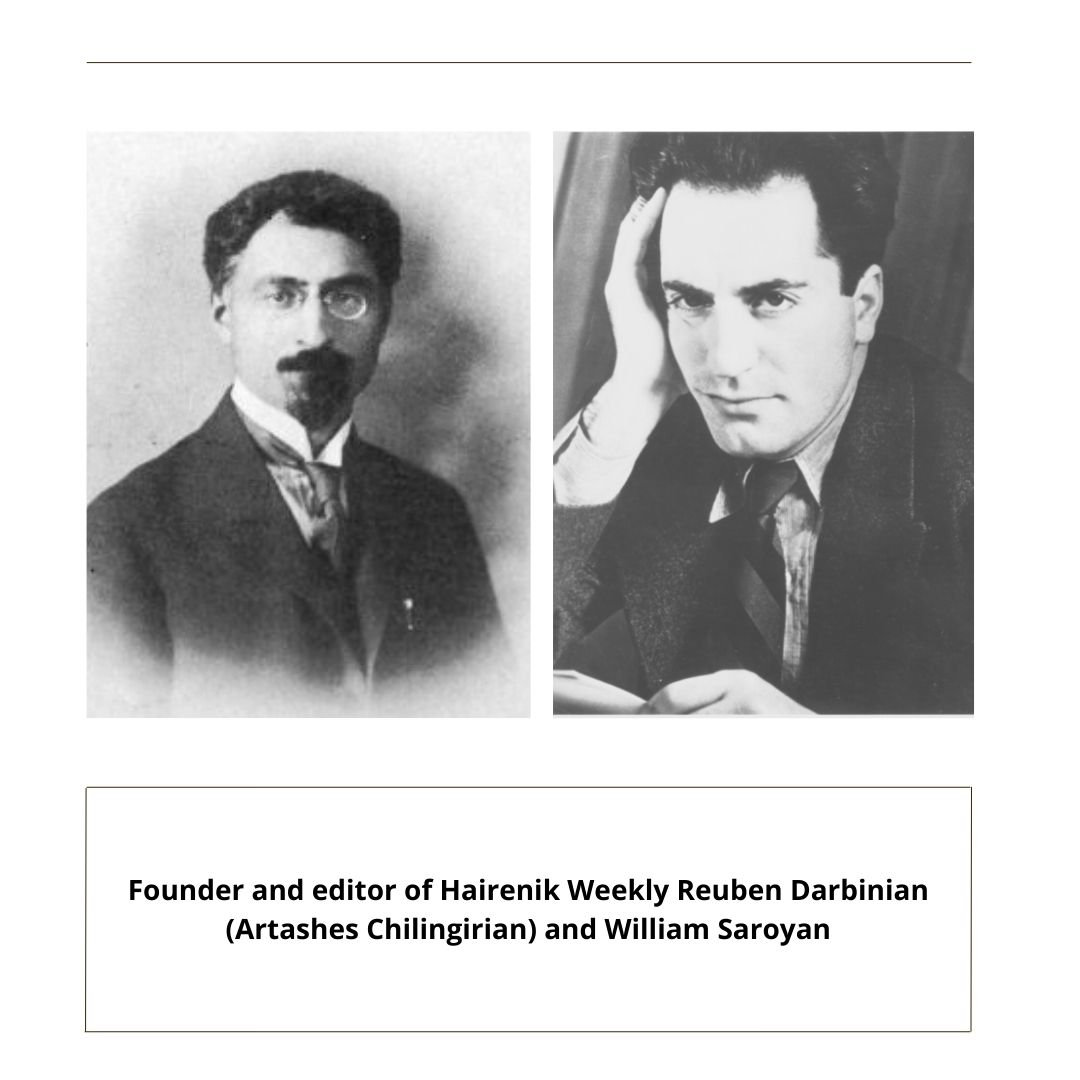

On the 107 anniversary of the Armenian Genocide we are looking back at this letter by William Saroyan to the founding editor of Hairenik Weekly, Dr. Reuben Darbinian on Nov. 9, 1934, where he explores what being an Armenian means to him:
“The acceptance of my writing by American literature is significent to every Armenian in this country, and especially significant to those members of the younger generation who wish to make some contribution to American art. I am deeply interested in the growth of an Armenian American art, because I believe the Armenian consciousness is a rich consciousness, deep-rooted, wise and strong.
Anyone who knows anything at all of my work knows I am opposed to groups interested in the individual. The importance of politics I question. The importance of racial growth in the individual I cannot question. The continuity of mortal thought occurs in men who walk alone, who journey over a lonely, and sometimes bitter path. My sympathies are with such men. I am determined that they shall not be swallowed by the sterile ideas of the masses, and standardized, and regimented and nullified.
The basic object of my own writing has been to reveal to others of my race that ultimate acceptance, though difficult, is certainly not impossible, and is, on the contrary, inevitable. The true Armenian spirit is a spirit of almost mad determination, and I (as an individual, as one Armenian) want it to remain the same. There can never be many who must walk alone, but in our race there are usually enough.
If there are three or four Armenians of this sort in America today, it is enough, and I am interested in these three or four. The individual articulates his race, gives it meaning, dignity, strength, the capacity to suffer and yet to be whole, to grieve and yet to rejoice, to weep and yet to laugh.
I do not know what the mob ever does, and by the mob I mean every confounded Armenian group in this country, political, religious and social. I hate crowds. I find the efforts of gangs idiotic. I find the community prayer silly and blasphemous. I find political oratory false and cheap. I find social events wasteful and disgusting. I am interested in the great Armenia, not the petty Armenia.
I am interested in the magnificence of my race, which blossoms only in the heart and mind of the man who finds himself and thereby finds his race. I am determined that if there are three or four young Armenians in America of this sort, they shall not be destroyed by the mob, because these men will resurrect the great Armenia, the Armenia which nothing can efface from the earth and from life, the Armenia I know, and am, and love.

The weakness of our race I know. The greed of my people I know. Their hatred for one another I know. The malice of one group for another I know. These are the evile (though normal) qualities common to all races, and we need not worry about them. They indicate, at least, that we have not become resigned and indifferent, that we are yet alive, though bewildered and unwhole. Nobler qualities of. the race can flourish only in the individual, and must flourish.
I shall not be unreasonable as to ask the impossible. Mr. Darbinian, I shall not say that in politics we cannot be brothers, because I know that in politics we cannot be brothers, I shall not ask that our quarreling end. By all means let the battle continue. But the great Armenia is greater than the politics of Armenian mobs. Our folk-songs are greater than our oratory. Our laughter, born of ancient suffering, dispels our bitterness toward one another. And when we grieve, we grieve with ancient and timeless Armenia. In matters of the spirit we are brothers, and we have always been, and shall always be. This is the true greatness of our race. Still, no race is so great that its masses are not ordinary. It is normal for the masses to be unaware of their own dignity and strength.
And it is normal for the individual to create and perpetuate in himself the , greatness of his race, and all that I ask is that the individual be permitted to breathe as an individual and not be suffocated by false and evanescent mob-ideas.
I know I shall be reprimanded by men older than myself, and I welcome their criticisms without fear and without bitterness. I speak for myself, for the Armenia I have discovered in myself, nourished, and brought to life. I speak for the great Armenia, and if there is a lesser Armenia, I refuse to acknowledge it. I refuse to be of it, since it is not the Armenia I know and love, the Armenia I am seeking to perpetuate.”
With Saroyan’s permission, this letter was published under the title “My Armenia” in Hairenik Weekly, on November 16, 1934, shortly after the appearance of his first book, The Daring Young Man on the Flying Trapeze.
Nona Balakian in her book "The World of William Saroyan" writes: "What is revealed in his letters to the Armenian editors is his consistent identification of race with character rather than a place - Armenia as a state of mind, a cultural entity, an immutable carrier of ancient experiences distilled by time and memory."